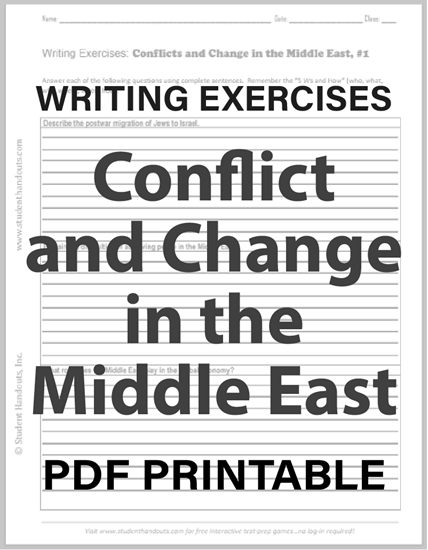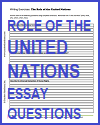| Middle Eastern Conflict Writing Exercises Worksheets |
|---|
| www.studenthandouts.com ↣ World History ↣ Middle East Conflict ↣ Middle East Conflict Worksheets |
 |
   |
|
Middle Eastern Conflict Writing Exercises Handout #1 1. Describe the postwar migration of Jews to Israel. After World War II and the Holocaust, large numbers of Jewish survivors and refugees migrated to the British-controlled territory of Palestine, seeking safety and a homeland. The horrors of the Holocaust intensified global support for the establishment of a Jewish state. Tensions with Arab populations grew, and in 1948, the state of Israel was declared, prompting further waves of Jewish immigration from Europe and the Middle East. 2. Explain the difficulties of achieving peace in the Middle East. Achieving peace in the Middle East is difficult due to deep-rooted historical conflicts, religious and ethnic divisions, and competing national interests. The Israeli-Palestinian conflict, territorial disputes, and foreign intervention further complicate peace efforts. Extremism, cycles of violence, and lack of trust between parties hinder negotiations. Additionally, economic inequality and access to resources contribute to long-standing tensions across the region. 3. What role does the Middle East play in the global economy? The Middle East plays a crucial role in the global economy due to its vast reserves of oil and natural gas. Countries like Saudi Arabia, Iran, Iraq, and the United Arab Emirates are major energy exporters, influencing global energy prices. The region's strategic location also makes it a key hub for international trade routes. Political instability, however, can impact economic stability and global markets. Click here to print. Answers may vary. |
|
Middle Eastern Conflict Writing Exercises Handout #2 1. Describe the role of Egypt in the Middle Eastern peace process. Egypt has played a central role in the Middle Eastern peace process, particularly as the first Arab country to sign a peace treaty with Israel in 1979. Under President Anwar Sadat, Egypt helped open diplomatic channels and set a precedent for negotiation over conflict. Since then, Egypt has often acted as a mediator in Israeli-Palestinian tensions and broader regional disputes, advocating for stability and dialogue. 2. What role does Islamic fundamentalism play in modern world politics? Islamic fundamentalism plays a significant role in modern world politics by influencing both regional conflicts and global security concerns. Rooted in a strict interpretation of Islamic principles, fundamentalist movements have led to the rise of extremist groups, such as al-Qaeda and ISIS, which have carried out terrorist attacks and destabilized governments. Additionally, fundamentalist ideologies can impact national policies, human rights, and international relations in countries where they gain political influence. 3. Describe the roles played by the United States and Soviet Union in the Iran-Iraq War. During the Iran-Iraq War (1980-1988), the United States and the Soviet Union both played complex roles. The U.S. supported Iraq with intelligence and military aid to counterbalance Iran's influence, fearing the spread of Islamic revolution. The Soviet Union also backed Iraq with weapons and political support, despite prior ties with Iran. Both superpowers aimed to maintain regional stability and protect their strategic interests in the Persian Gulf. Click here to print. Answers will vary. |
|
Middle Eastern Conflict Writing Exercises Handout #3
1. Describe the events of the Iranian hostage crisis. The Iranian hostage crisis began in November 1979 when Iranian revolutionaries stormed the U.S. Embassy in Tehran, taking 66 American diplomats and citizens hostage. The crisis followed the Iranian Revolution and U.S. support for the ousted Shah. Hostages were held for 444 days, sparking a major diplomatic standoff. The crisis ended on January 20, 1981, the day Ronald Reagan was inaugurated as U.S. president. 2. In what ways have the Kurds of Iraq and Turkey been persecuted? Why? The Kurds of Iraq and Turkey have faced persecution through cultural suppression, displacement, and violent crackdowns. In Turkey, Kurdish language and identity were historically banned, while political activism was met with imprisonment or violence. In Iraq, under Saddam Hussein, Kurds endured the Anfal campaign, involving chemical attacks and mass killings. These actions stem from fears of Kurdish separatism and the desire of central governments to maintain territorial unity. 3. What does "PLO" stand for? Describe the PLO. "PLO" stands for the Palestine Liberation Organization. Founded in 1964, the PLO was created to represent the Palestinian people and their national interests, particularly the goal of establishing an independent Palestinian state. Initially associated with armed struggle and viewed as a terrorist organization by some countries, the PLO later shifted toward diplomacy and negotiations. In 1993, it signed the Oslo Accords with Israel, gaining international recognition as the legitimate representative of Palestinians. Click here to print. Answers will vary. |
| www.studenthandouts.com ↣ World History ↣ Middle East Conflict ↣ Middle East Conflict Worksheets |














































